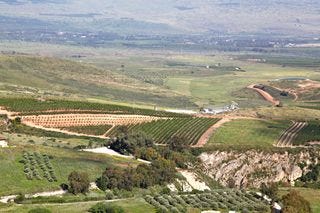I Was On the Trail Last Week for Really Good Wine in….. Israel!
And I found it.
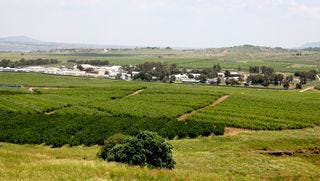
There are only a handful of wine-producing countries, which I’ve wanted to visit but missed the chance, and near the top of the list is/was Israel.
Friends have been telling me for years that they’ve had really good Cabernets from the Holy Land and now that I’ve just been, I can say, “Holy Smokes, they were right!”
It turns out that, according to guidelines, the practice of making Kosher wines isn’t all that different from practices, employed to make top-tier wines in Napa Valley.
Here’s what you need to do to make Kosher wine:
You can’t pick grapes from the vine until the fourth harvest.
Here in Napa Valley, most winemakers start to pick in the third year after planting, what we call “third leaf.”
No other fruits or vegetables may be grown between the rows of vines.
We pretty much observe the same practices here.
The Israelis insist that every seventh year, the vineyard must lie fallow.
This must mean leaving the fruit wither on the vine, because, for sure, they’re not tearing out their vines every seven years and replanting.
This appears to be one of the differences in the practice of making Kosher wine versus Napa Valley wine. Due to sheer economic realities, no one here can afford to leave his, or her, vineyard untouched every seventh year.
Another element, which we do not follow; to make Kosher wine, only a religiously observant Jew may come into contact with the grapes arriving at the winery.
There aren’t enough Jewish winemakers in Napa Valley to spread around the 500 wineries here, so methinks this valley’s not going to be turned into an all-Kosher wine zone.
Another area where there is often overlap: to make Kosher wine, all the materials used in the production – including yeasts and fining and filtering agents – must be certified Kosher. Often, these materials happen to be Kosher here just by happenstance.
My wine travels in Israel
I tasted some sensational wines in Israel, traveling through the Upper Galilee and Golan Heights wine-producing regions.
Tishbi
Golan Tishbi, winemaker at Tishbi Winery
If you want to meet one of the most dynamic, happy-go-lucky, entrepreneurs in Israel, head to Tishbi Winery in Benyamina, in the hills overlooking the coastal Plain of Sharon, south of Haifa.
Yes, you may meet his mom and pop, but for sure, you want to meet their wiry, fiery, son, Golan, a fifth-generation Tishbi who has become the family winemaker. And a damned good one, at that.
The Tishbi family has been making wine since 1882, originally planting vines on the slopes of Mount Carmel, following in the footsteps of Bordeaux' Baron de Rothschild, who had a lot to do with the establishment of vineyards and a wine industry in the region.
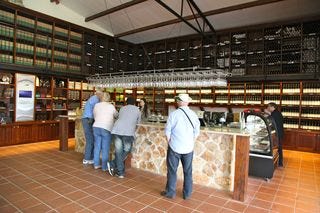
Tishbi’s tasting room
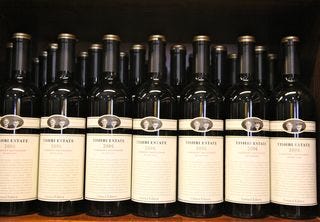
Ever the promoter, Golan contracted with the fine Swiss chocolate producer, Valrhona, to become its exclusive distributor in Israel.
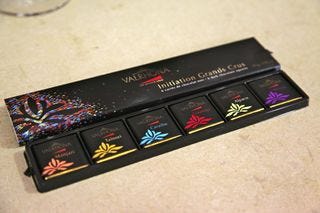
At the winery, to promote chocolate AND wine sales, Golan has invented a tasty, informative pairing – of six different Valrhona chocolates with six different Tishbi wines. The fact that these wines are Kosher is completely irrelevant to the experience.
The tasting chart, which visitors can use as they pair Tishbi wines and Valrhona chocolates.
When you’re finished the tasting, you can head over to Tishbi’s on-site bakery to buy some hot, homemade breads, or you can sit in the winery’s pizzeria area, where a fully trained chef turns out delicious pizzas in a gas-fired hearth.

Or refill an empty jug you might have brought along with a pleasant, $5-a-liter, red Tishbi blend.
Adir

Walking into the tasting room at Adir, I felt as though I had magically been transported to a chic tasting room in British Columbia’s Okanagan Valley, or perhaps to that of one of Ontario’s newer wineries, Tawse.

The room is strikingly white, designer friendly, and the wines are delicious.
This Upper Galilee winery produces Cabernet, Cab Franc, Merlot, Chardonnay and a lush Syrah (which they insist on calling Shiraz for the marketing value).
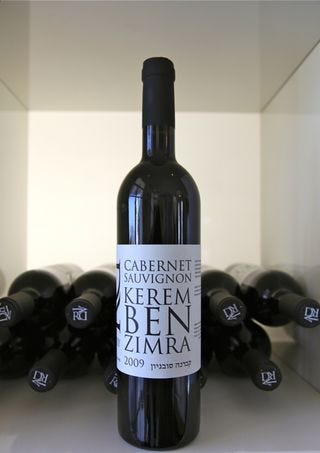
I thought the best wine of my tasting here was the 2007 Plato (top-tier) Cabernet Sauvignon, produced from 22-year-old vines. The wine contains eight percent Syrah and was aged two years in 100 percent new French oak.
Dalton
At Dalton winery, I tasted the single best Israeli wine I’ve ever had, a stunning 2008 Dalton Reserve Cabernet, which was impeccably balanced, full of ripe, red and dark fruits, and in a word (noted in the my tasting notes), “delicious!”
I scored this beauty 93 points.
In fact, I was so struck by this wine that upon returning home, I found a wine merchant in New York State who sells it for $31 a bottle and ordered some. You’d be smart to do likewise. The wine is $36 at the winery, so anything less from an American wine merchant is a bonus.
Naama Sorkin, winemaker at Dalton Winery
The wines at Dalton are made by a talented female, Naama Sorkin, who learned her craft in Australia. She has been making the wines at Dalton since 2002.
Dalton produces about 75,000 cases of wine a year, 30 percent of which are white.
Summary
Here’s my thinking on Israel’s Kosher wine conundrum.
For starters, you’d never know these wines were “Kosherized” when you taste them. They smell, look, and taste like first-class wines coming out of other wine regions of the world.
In my opinion, Israel has suffered the same fate as Italy’s wine industry; that nation first exported pathetic, poorly made wines in straw-covered bottles (called fiasci). American consumers were initially taught to think of these wines as “Chianti.”
It took Italy 40 years to overcome this stigma; based on our earliest experiences, we thought all Italian wines were this bad.
The same fate has happened to Israel’s wines. Our earliest experiences were wines that had been pasteurized (oy vey! Can you imagine heating wine to the point of boiling? THIS is going to win the mind, heart and pocketbook of consumers??).
Others grew up thinking that all Israeli Kosher wines must taste foxy and sweet like Manischewitz, made from Concord grapes.
It’s no wonder that we came away thinking Kosher wines are a bust.
I don’t know when Israeli winemakers started cleaning up their act, to follow universally accepted winemaking practices, but certainly, over the last ten years, they’ve matured these practices and are now making truly fine wines competitive with what’s being produced in other wine regions of the world. But, by and large, the American consumer doesn’t yet know this.
American consumers have to catch up; our appreciation of Israeli wines is pretty much how we thought of Italian wines in the early 80s, before we collectively became aware that Italy’s wine industry had caught up to the rest of the world.
Today, we see single-vineyard Italian Cabs or Sangiovese blends, called Super Tuscans, priced at $300 and we don’t blink. We’ve come to recognize that the Italians KNOW how to make great wine and we accept this concept.
We’re about 20 years behind in our appreciation of what Israel is turning out. If you see a “Kosher” wine from Israel – don’t fight the trend; as a Jewish mother might say, “Try it…. You’ll like it!”
